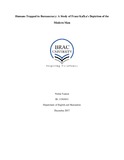| dc.contributor.advisor | Saba, Anika | |
| dc.contributor.author | Tasnim, Nishat | |
| dc.date.accessioned | 2018-03-20T05:44:14Z | |
| dc.date.available | 2018-03-20T05:44:14Z | |
| dc.date.copyright | 2017 | |
| dc.date.issued | 2017-12 | |
| dc.identifier.other | ID 13303031 | |
| dc.identifier.uri | http://hdl.handle.net/10361/9708 | |
| dc.description | This thesis is submitted in partial fulfillment of the requirements for the degree of Bachelor of Arts in English, 2017. | en_US |
| dc.description | Cataloged from PDF version of thesis. | |
| dc.description | Includes bibliographical references (pages 46-47). | |
| dc.description.abstract | Franz Kafka is one of the greatest writers of twentieth century who explores the complexity of bureaucracy in his literary works. His novels and short stories show the crisis of modern man through anguished characters have become important figure in the twentieth century Europe literary tradition. Kafka belonged to a Jewish family in Prague. During his lifetime he worked in insurance companies which made him experimentally and intellectually aware of the fact that humans are slaves of the modern bureaucratic system. The reason why humans are under the enslavement of this system is due to rapid growth of industrialization, urbanization and commercial institutions. These are only a means to serve the purpose of capitalistic and bureaucratic purposes. Kafka’s characters such as Gregor Samsa in The Metamorphosis and Joseph K in The Trial are vivid illustrations of humans trapped within the hierarchy and the web of bureaucracy which existed within the capillary of Kafka’s society. Modern man of twentieth century Europe reflects the hollowness of existence. Their nightmarish situations slowly progress towards death or slavery, a neurotic journey of the individuals in a bureaucratic trial filled with unnamed anxiety and condemned to a torturous abyss. The disjuncture out of which the aguish originates in Kafka’s characters has a direct relation with bureaucratic culture present in Kafka’s time. The fundamental aim of this thesis is to illustrate how Kafka’s characters suffer from unnamable torments and their suffering makes the readers aware of how modern man is trapped in the web of bureaucracy, and my discussion in this thesis will be an attempt to show this through textual analysis of his works. | en_US |
| dc.description.statementofresponsibility | Nishat Tasnim | |
| dc.format.extent | 47 pages | |
| dc.language.iso | en | en_US |
| dc.publisher | BRAC University | en_US |
| dc.rights | BRAC University thesis are protected by copyright. They may be viewed from this source for any purpose, but reproduction or distribution in any format is prohibited without written permission. | |
| dc.subject | Franz Kafka | en_US |
| dc.subject | Bureaucracy | en_US |
| dc.subject | Twentieth century | en_US |
| dc.subject | Europe | en_US |
| dc.title | Humans trapped in bureaucracy: a study of Franz Kafka’s depiction of the modern man | en_US |
| dc.type | Thesis | en_US |
| dc.contributor.department | Department of English and Humanities, BRAC University | |
| dc.description.degree | B.A. in English | |

